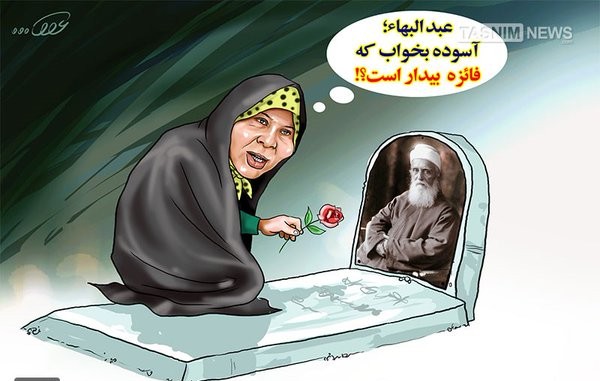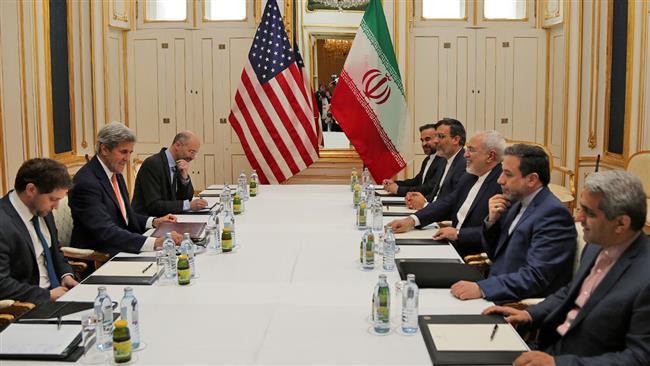PHOTO: Iranian Foreign Minister Mohammad Javad Zarif meets US Secretary of State John Kerry in Vienna on Tuesday
LATEST
- Supreme Leader Blasts “Satanic” US and Saudi Arabia
- Senior Officials Continue Criticism of Rafsanjani’s Daughter
Reflecting the lack of progress in Tuesday’s international meeting on the Syrian crisis, Iran has blamed “governments in the region and outside the region” supporting “terrorists” for the five-year conflict.
Tehran, which has stepped up its military intervention behind the Assad regime since last October, was one of the 17 countries in the gathering of the International Syria Support Group. The meeting called for a renewal of the February 27 “cessation of hostilities” and for the Assad regime to allow aid into besieged areas.
See Syria Daily: International Group Makes Little Progress in Vienna Meeting
However, Iranian Foreign Minister Mohammad Javad Zarif acknowledged that the session ended without “any groundbreaking” developments, although he asserted that importance lay in the “general consensus that we need to expand the cessation of hostilities to include all of Syria”.
With the collapse of the ceasefire in northwest Syria, Iran is in a difficult position. Russian and regime airstrikes have killed hundreds of civilians, particularly in and near Aleppo city, but they have failed to check advances by rebels and the jihadists of Jabhat al-Nusra in Aleppo and other provinces. Those advances have inflicted significant casualties on Iranian units, who are leading the pro-Assad campaign on the southern Aleppo front.
Zarif began on Tuesday with a diplomatic gesture towards the ISSG members, including Iran’s rival Saudi Arabia, who supports the Syrian rebels.
However, he then turned on the Saudis and other supporters of the opposition-rebel bloc, using the pretext of Jabhat al-Nusra, which is excluded from the cessation of hostilities:
The most important loopholes were the fact that al-Nusra, which is a major terrorist organization operating in many areas that are now undergoing serious humanitarian catastrophe, continues to be collaborating with various groups that have been supported by governments in the region and outside the region and there is a need to once and for all deal with that.
The Foreign Minister did not refer to the obstacles to political progress, including President Assad’s refusal of any transitional governing authority and the Syrian regime’s refusal of aid into besieged areas. Instead, he repeated Tehran’s stock line about support of “Syrians”:
It’s a Syrian-owned, Syrian-led process. People here are supposed to help…not to dictate to the Syrian people and this is what we have been pointing out time and again.
Zarif met other diplomats on the sidelines of the conference, including US Secretary of State John Kerry, British Foreign Secretary Philip Hammond, and Omani Foreign Minister Yussef bin Alawi. However, he did not see his Saudi counterpart, Adel al-Jubeir.
Supreme Leader Blasts “Satanic” US and Saudi Arabia
The Supreme Leader has continued his rhetorical assault on the US and Saudi Arabia, proclaiming them to be “Satanic” powers against Islam.
Ayatollah Khamenei told an international Qur’an competition in Tehran on Wednesday:
Some Islamic governments are betraying their people and the Islamic Ummah [community] and paving the way for the American influence….Those who are implementing the American policy in the region are adhering to Taghut [idolatry].
#Terrorist & #Takfiri groups & #Wahhabi proxies are taking efforts & acting on behalf of enemy in sowing discord among Muslims. 1/2
— Khamenei.ir (@khamenei_ir) May 18, 2016
He continued, “Satanic powers are scared of Islam and the 1.5-billion Muslim community….We have no doubt victory belongs to Islam.”
Senior Officials Continue Criticism of Rafsanjani’s Daughter
Senior officials are continuing to denounce the daughter of former President Hashemi Rafsanjani over her visit last week with a Baha’i political prisoner.
Mohsen Rezaei, the Secretary of the Expediency Council, said on Tuesday, “Support for false religions is not a dimension of human rights….If someone in Iran establishes a relationship with false religions, it is political.”
A provincial representative of the Supreme Leader said the meeting with Fariba Kamalabadi, a Baha’i activist on furlough from a 10-year prison sentence, was tantamount to “conformity with international Zionism” and called on the judiciary to investigate the meeting.
Hashemi was a cellmate of Kamalabadi in 2012-2013, when Rafsanjani’s daughter served a six-month sentence for “propaganda against the regime”. She was joined in the meeting by other former political prisoners, overseen by a portrait of a Baha’i leader from the early 20th century.
See Iran Feature: Rafsanjani’s Daughter Provokes Anger by Meeting Baha’i Political Prisoner
Head of judiciary Sadegh Larijani, and Grand Ayatollah Makarem Shirazi led the campaign against Hashemi, declaring members of the Baha’i faith “agents of Israel and America”.
Facing the political pressure, Rafsanjani — long a target of Iran’s hardliners in regime in-fighting — said his daughter “has made a bad mistake and must atone”.
A cartoon in Tasnim News mocks Hashemi, pictured at the grave of the Baha’i Prophet Bahaullah, with a 1975 quote from the Shah about the Persian King Cyrus, “We continue your legacy.”


